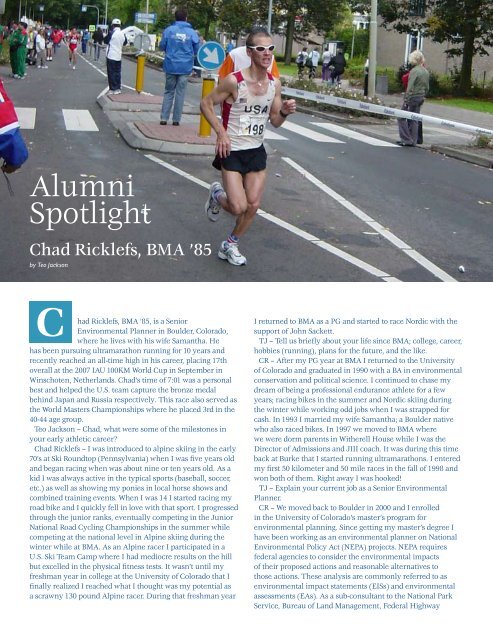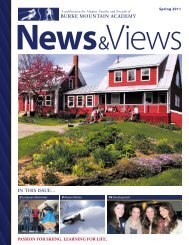Chad Ricklefs, A'85 - Burke Mountain Academy
Chad Ricklefs, A'85 - Burke Mountain Academy
Chad Ricklefs, A'85 - Burke Mountain Academy
Create successful ePaper yourself
Turn your PDF publications into a flip-book with our unique Google optimized e-Paper software.
Alumni<br />
Spotlight<br />
<strong>Chad</strong> <strong>Ricklefs</strong>, BMA ’85<br />
by Teo Jackson<br />
C had <strong>Ricklefs</strong>, BMA ’85, is a Senior<br />
Environmental Planner in Boulder, Colorado,<br />
where he lives with his wife Samantha. He<br />
has been pursuing ultramarathon running for 10 years and<br />
recently reached an all-time high in his career, placing 17th<br />
overall at the 2007 IAU 100KM World Cup in September in<br />
Winschoten, Netherlands. <strong>Chad</strong>’s time of 7:01 was a personal<br />
best and helped the U.S. team capture the bronze medal<br />
behind Japan and Russia respectively. This race also served as<br />
the World Masters Championships where he placed 3rd in the<br />
40-44 age group.<br />
Teo Jackson – <strong>Chad</strong>, what were some of the milestones in<br />
your early athletic career?<br />
<strong>Chad</strong> <strong>Ricklefs</strong> – I was introduced to alpine skiing in the early<br />
70’s at Ski Roundtop (Pennsylvania) when I was five years old<br />
and began racing when was about nine or ten years old. As a<br />
kid I was always active in the typical sports (baseball, soccer,<br />
etc.) as well as showing my ponies in local horse shows and<br />
combined training events. When I was 14 I started racing my<br />
road bike and I quickly fell in love with that sport. I progressed<br />
through the junior ranks, eventually competing in the Junior<br />
National Road Cycling Championships in the summer while<br />
competing at the national level in Alpine skiing during the<br />
winter while at BMA. As an Alpine racer I participated in a<br />
U.S. Ski Team Camp where I had mediocre results on the hill<br />
but excelled in the physical fitness tests. It wasn’t until my<br />
freshman year in college at the University of Colorado that I<br />
finally realized I reached what I thought was my potential as<br />
a scrawny 130 pound Alpine racer. During that freshman year<br />
I returned to BMA as a PG and started to race Nordic with the<br />
support of John Sackett.<br />
TJ – Tell us briefly about your life since BMA; college, career,<br />
hobbies (running), plans for the future, and the like.<br />
CR – After my PG year at BMA I returned to the University<br />
of Colorado and graduated in 1990 with a BA in environmental<br />
conservation and political science. I continued to chase my<br />
dream of being a professional endurance athlete for a few<br />
years; racing bikes in the summer and Nordic skiing during<br />
the winter while working odd jobs when I was strapped for<br />
cash. In 1993 I married my wife Samantha; a Boulder native<br />
who also raced bikes. In 1997 we moved to BMA where<br />
we were dorm parents in Witherell House while I was the<br />
Director of Admissions and JIII coach. It was during this time<br />
back at <strong>Burke</strong> that I started running ultramarathons. I entered<br />
my first 50 kilometer and 50 mile races in the fall of 1998 and<br />
won both of them. Right away I was hooked!<br />
TJ – Explain your current job as a Senior Environmental<br />
Planner.<br />
CR – We moved back to Boulder in 2000 and I enrolled<br />
in the University of Colorado’s master’s program for<br />
environmental planning. Since getting my master’s degree I<br />
have been working as an environmental planner on National<br />
Environmental Policy Act (NEPA) projects. NEPA requires<br />
federal agencies to consider the environmental impacts<br />
of their proposed actions and reasonable alternatives to<br />
those actions. These analysis are commonly referred to as<br />
environmental impact statements (EISs) and environmental<br />
assessments (EAs). As a sub-consultant to the National Park<br />
Service, Bureau of Land Management, Federal Highway
Administration, and other agencies I manage the preparation<br />
of EISs and EAs. I think that I always knew I wanted to<br />
eventually work to help protect the natural environment, and<br />
I am sure spending so much time in the Northeast Kingdom<br />
had something to do with that.<br />
TJ – What have BMA’s values taught you about life after<br />
high school and college? Were there any <strong>Burke</strong> principles that<br />
carried over and proved useful?<br />
CR – Of course BMA has had a major influence on how I<br />
have approached life. The values that BMA is based on have<br />
carried over into my personal and work life. Growing up in<br />
the BMA community provided a solid foundation based on<br />
trust and honesty. These values have helped me forge strong<br />
relationships with professional clients as well as with family<br />
members.<br />
TJ – How has the close-knit community of BMA affected you<br />
positively or negatively in the real world? What has it taught<br />
you?<br />
CR – I think that the closeness of the BMA community<br />
taught me to respect other people’s beliefs and values which<br />
has been invaluable in my professional career. I think that<br />
the one downfall of living in such a small community was<br />
trying to integrate into a large community at CU. Moving to<br />
Boulder from East <strong>Burke</strong> as an 18-year old was a challenge.<br />
There definitely wasn’t that close-knit feeling like BMA. It took<br />
awhile to remove myself from the distractions and focus on<br />
what was important to me, athletics and education.<br />
TJ – What did <strong>Burke</strong> prepare you well for? What did <strong>Burke</strong><br />
not prepare you for?<br />
CR – As I just mentioned, I think that I wasn’t really prepared<br />
for the realities of life in a town like Boulder. Being somewhat<br />
isolated from “distractions” at BMA may have made it easier<br />
for me to focus on my athletics and education. However, BMA<br />
definitely provided me with the skills to set goals and to go<br />
after them like there was no tomorrow; both athletically and<br />
professionally.<br />
TJ – Boulder is an obvious choice of residence for a runner of<br />
your caliber, how has the active lifestyle there allowed you to<br />
pursue, and excel, as a long distance runner?<br />
CR – For me Boulder is the ideal location to train. Being<br />
surrounded by world class cyclists, marathoners, triathletes,<br />
etc. provides excellent motivation. It is uncommon to not run<br />
into some world class athlete during a training run. I have also<br />
been lucky to hook up with a great coach, Mark Plaatjes (1993<br />
world marathon champion), who is also my physical therapist.<br />
Another benefit of living in Boulder is the ability to train at<br />
altitude.<br />
TJ – How does your job allow you to be a long distance<br />
runner? I’m sure a quick hour long run around the track isn’t<br />
what prepares you for an ultramarathon. And was your choice<br />
of career affected by your desire to run?<br />
CR – Fortunately my employer is flexible and allows me<br />
to train when I need to. Although running between 1 and 2<br />
½ hours before work still requires me to be on the roads by<br />
5 a.m. ( and I thought the 6:45 morning runs at BMA were<br />
early). I like to get my run in before work so that I don’t have<br />
to worry about escaping from work to go run.<br />
TJ – On the same note, tell us a little about your training.<br />
What’s it take to be an ultramarathoner?<br />
CR – As you can imagine, training for ultramarathons<br />
requires spending a lot of time on the roads and trails. A<br />
typical week during the peak of my season includes intervals,<br />
hill repeats, or tempo workouts on Tuesday and Friday (1 ½ to<br />
2 hours per session), a 2 – 2 ½ hour run on Wednesday, and an<br />
easy 1 hour recovery run on Thursday. My runs on weekends<br />
range between 2 to 6 hours depending on what race distance I<br />
am preparing for. For example, I was doing 6 hour runs on both<br />
Saturday and Sunday leading up to my 100 mile trail races. I<br />
also have learned that as I get older I need to spend two days<br />
in the weight room to help avoid injuries. As you can see, my<br />
days are pretty packed so there is not a lot of time to spend on<br />
things other than training and work. Competing at the level I<br />
do in ultras while also having a full time professional career<br />
has forced me to make many sacrifices. I know that I only<br />
have a few more years left in me at the elite level; after that<br />
there will be plenty of time to relax and enjoy some snackies!<br />
TJ – You recently placed 17th overall, 3rd for your age<br />
category, in an IAU 100 km World Cup in the Netherlands,<br />
reaching a personal best time of 7:01. What was this<br />
experience like? How did it feel to be all the way over in<br />
Europe and have such a great race, competing for the USA<br />
Track and Field’s 100 km Ultramarathon Team?<br />
CR – Last year’s World 100 Kilometer Championships was an<br />
incredible experience. After nearly 25 years of pursuing my<br />
dream of competing at an international level championship,<br />
I finally was able to live that dream. Racing in Europe is<br />
awesome! As you can imagine, ultrarunning in the U.S. is<br />
not very popular so the crowds and interest in races is small.<br />
Europeans live for obscure sports like ultras, cycling, Nordic<br />
skiing, etc., so the crowds are always large and in typical<br />
fashion very boisterous! Competing in a USA uniform was<br />
inspiring and I am sure helped me run a personal best time<br />
for the 100 kilometer distance. I have already qualified for<br />
the 2008 U.S. World 100 Kilometer Championships team and<br />
have started preparing for that event (being held in Italy in<br />
November). My goal is to improve on my overall pacing by<br />
finishing in the top ten. This year’s course has some hills<br />
which will play into my strength. n



